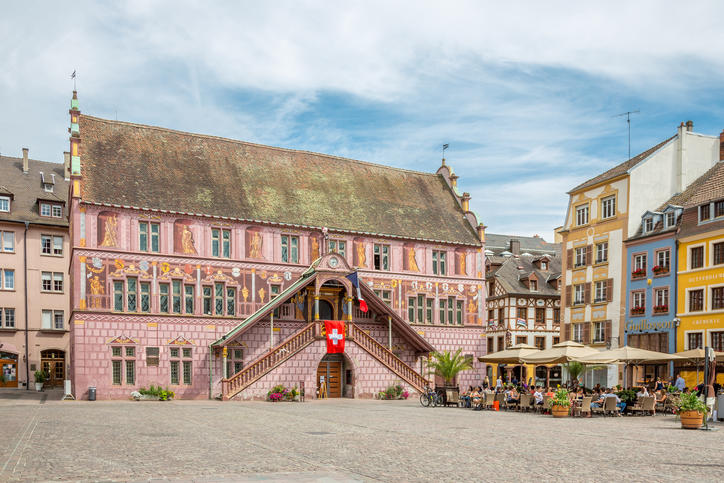
Jobs and accommodation in France: Revenge of the middle-sized cities!
This year’s recently published ranking of cities, made by two professional websites specialised in employment and real estate, MeilleurTaux and MeteoJob, shows nice opportunities in terms of work and real estate. The ranking confirms a strong drawing power from middle-sized cities in France, with Mulhouse, Orléans and Dijon on the podium.
Ce classement, réalisé tous les ans, confirme une tendance liée au contexte sanitaire. Comme l’écrivent les deux sites internet "ces presque deux années impactées par la crise de la Covid-19 ont eu des conséquences sur de nombreux secteurs, et notamment les secteurs du recrutement et de l’immobilier". Cette période particulière, poursuivent-ils, "a fondamentalement changé les habitudes des Français : départs des grandes villes synonymes de logements trop petits et trop chers, généralisation du télétravail dans de nombreuses entreprises".
Les villes moyennes, plus favorables à l’emploi et à l’immobilier
Les grandes villes ne font plus rêver ! Tel est le premier constat de cette étude. En matière immobilière d’abord, les souhaits des Français semblent avoir évolué depuis les confinements successifs. Ainsi, "les habitants des grandes villes aspirent à plus grand et sont désormais à la recherche d’une habitation plus vaste", une aspiration que peuvent satisfaire les villes moyennes qui sont particulièrement attractives. Pour ceux qui "sont en manque d’espace", ces villes offrent un confort de vie et surtout "des mètres carrés supplémentaires, pour un budget qui peut être divisé par 5 pour la même surface". Sans compter que ces mêmes villes présentent des taux en CDI très élevés !
Pour réaliser en effet cette enquête les deux critères emploi/logement ont été croisés. Dans le Top 10 de ces villes à la fois propices à une offre immobilière accessible et à un marché du travail ouvert, se retrouvent des villes petites ou moyennes telles que Mulhouse, Orléans (la plus attractive de France en matière d’emploi), Dijon, Rouen, Saint-Etienne, Le Mans, Limoges, Tours, Metz, Besançon. A noter que toutes ces villes, dites moyennes, disposent d’une université ou d’une antenne universitaire importante sur place ainsi que de d’écoles spécialisées (management, ingénieurs, FLE, art etc.).
Une baisse d’attractivité pour les grandes villes
Après avoir pointé les villes où le marché de l’emploi et le logement se portent bien et vont de pair, l’enquête répertorie "les villes où le bassin professionnel est attractif mais le pouvoir d’achat immobilier un peu moins". C’est le cas notamment de Bordeaux, de Lyon, d’Aix-en-Provence, de Lyon, de Nantes et bien sûr de Paris. Sans surprise, les grandes villes telles que Paris, Marseille et Lyon ne présentent pas les meilleurs résultats, "si nous cumulons les deux données en les croisant : à savoir un terrain fertile à l’emploi et à l’obtention d’un CDI, et un logement correct en termes de prix et de superficie".
Autre absence remarquée dans le classement : les villes de l’arc méditerranéen (sauf Perpignan qui arrive en 14e position). Sans grand étonnement là-aussi, selon les commanditaires de l’enquête, les chiffres parlent d’eux-mêmes. Des villes comme Marseille, Montpellier et Nice "ne sont pas spécialement intéressantes ni sur le plan de l’attractivité professionnelle ni sur le plan du pouvoir d’achat immobilier".
Une méthodologie croisée
Cette étude a été établie à partir d’une série de données : offres d’emploi, types de contrats, salaires proposés, prix de l’immobilier et taux d’intérêt. Pour chaque ville, les salaires médians indiqués dans les offres ont ensuite été mis en rapport avec les taux d’intérêt recensés par MeilleurTaux et le prix de l’immobilier local afin de calculer "le pouvoir d’achat immobilier". Enfin, précise le site, "le taux de CDI pour 100 habitants a été multiplié par le pouvoir d’achat immobilier pour obtenir le classement des villes les plus attractives".
Related contents
-
CollectionStudent citiesMise à jourDecember 2023
-
CollectionStudent citiesMise à jourSeptember 2025
-
CollectionStudent citiesMise à jourSeptember 2025
Recommended News


























































